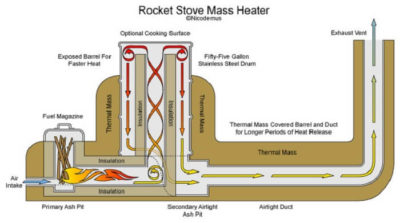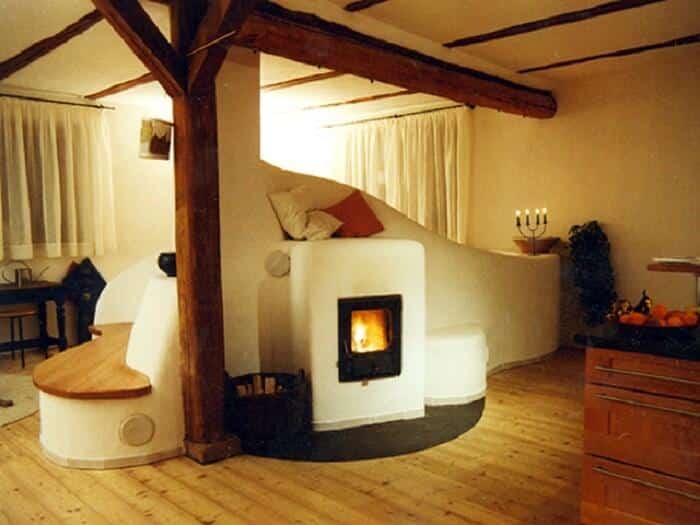Perhaps you’ve heard about rocket mass heaters in off-grid and homesteading circles, but what exactly are they?
A rocket mass heater is a special type of masonry stove that stores the majority of its heat in a large, thermal mass (like a bench attached to the stove itself). When built properly, a rocket mass heater burns a lot more efficiently than a modern day wood stove and lets out practically no exhaust — only carbon dioxide and steam. Sounds too good to be true, doesn’t it?
You can use practically any type of wood material as feedstock. Yard debris, sticks and even scrap lumber all can be used to burn inside the rocket mass heater. This makes them efficient and practical to use if you don’t live next to a forest with a large source of firewood logs.
Unlike the modern wood stoves on the market today, rocket mass heaters can be built completely on your own. Plans and blueprints for a wide variety of different rocket mass heaters exist online. And, depending on the size and type you decide to build, many can be completed in only a few days.
Let’s take a look at the inner workings of a simple rocket mass heater.
“The Big Book Of Off The Grid Secrets” — Every Homesteader Needs One!
One of the keys to a rocket mass heater is the different twists and turns that occur in the inner chamber of the heater itself. To start, the wood stock is put in vertically, so that only the bottom of the wood pieces burn. The bottom of the wood stock chamber then takes a sharp, 90-degree angle in toward the inner workings of the heater so that the fire itself is burning sideways, parallel with the floor. At the end where the fire is burning, the inner chamber takes another sharp 90-degree angle up toward the ceiling. This section is called the heat riser and it’s where all the magic happens. This heat riser section is contained in another structure like a barrel, so that there is a space between the insulated heat riser and the barrel that surrounds it.
Story continues below video
 As the heater is working, the heat riser gets extremely hot. This heat causes a convective current that continues to pull the fire into the riser. The sharp turn causes the smoke to be constantly mixed with fire and is consequently burned off, leaving you with an extremely clear exhaust comprised mostly of steam and carbon dioxide. As the hot air enters the riser, it travels toward the top of the riser and up into the barrel that surrounds the riser. At the top, the gases fall into the space between the barrel and the riser. The gases travel from here to underneath a thermal mass like a masonry bench to radiate heat into the room and onto your backside. At the end of the bench is an exhaust, so that the carbon dioxide and steam that is left over can escape.
As the heater is working, the heat riser gets extremely hot. This heat causes a convective current that continues to pull the fire into the riser. The sharp turn causes the smoke to be constantly mixed with fire and is consequently burned off, leaving you with an extremely clear exhaust comprised mostly of steam and carbon dioxide. As the hot air enters the riser, it travels toward the top of the riser and up into the barrel that surrounds the riser. At the top, the gases fall into the space between the barrel and the riser. The gases travel from here to underneath a thermal mass like a masonry bench to radiate heat into the room and onto your backside. At the end of the bench is an exhaust, so that the carbon dioxide and steam that is left over can escape.
Story continues below video
The masonry bench part of the rocket mass heater can be made out of a variety of materials, like concrete, stone or brick, but perhaps the cheapest and easiest to obtain would be cob. Cob is simply a mixture of sand, clay, water, fibrous material like straw and earth. It can be shaped to fit any space and acts as an efficient thermal mass. As the hot air travels underneath the bench, the thermal mass absorbs the high amounts of heat and can slowly release the heat out into the room. This type of heat storage and slow radiation is extremely efficient, and many rocket mass heaters remain hot several days after the fire feeding them goes out. In fact, a well-built rocket mass heater can cut out 80-90 percent of the wood used in a traditional stove.
With a little research into the different styles of rocket mass heaters, the materials best suited to your area and how to best integrate one into your space, you can be saving time, money and wood with something you built yourself.
Have you ever used a rocket mass heater? Share your thoughts on them in the section below:
Discover The Secret To Saving Thousands At The Grocery Store. Read More Here.
 Off The Grid News Better Ideas For Off The Grid Living
Off The Grid News Better Ideas For Off The Grid Living




